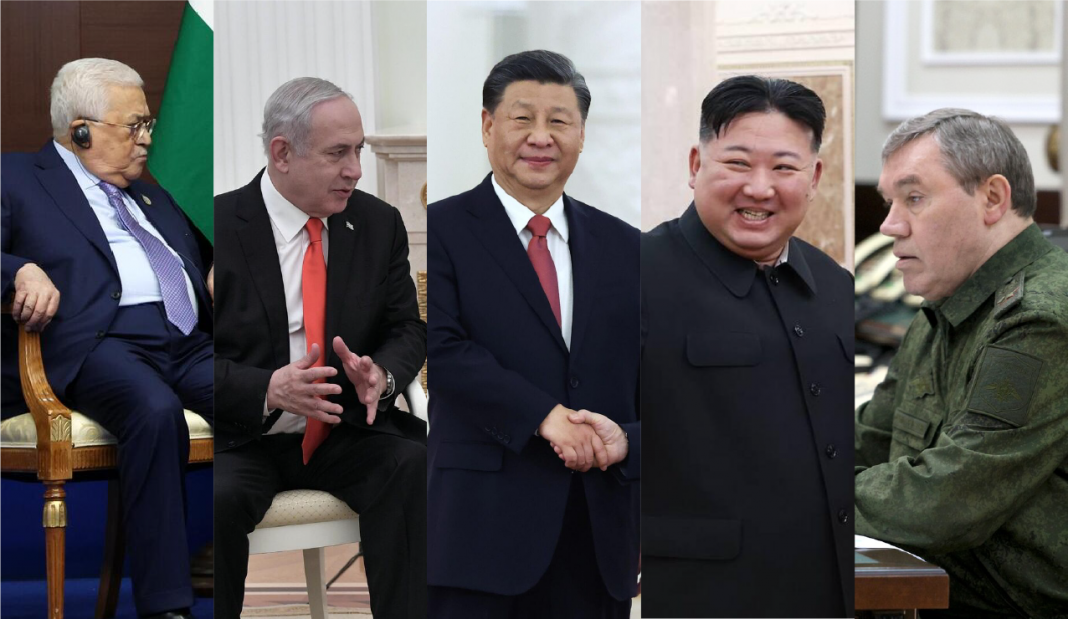This report describes the key events that significantly impacted Russia’s political, economic, and social processes.
Based on the results of the past week, the following trends can be summarised:
- Putin’s visit to China was perhaps the most anticipated (from Russia’s point of view) international event of the end of 2023. This visit attracted special public attention in Russia for several months; additional international consultations, discussions, etc., were held. However, the visible part of the visit brought rather modest results. Putin has clearly demonstrated that he views China as a senior partner, not an equal. But the very fact that Putin was placed on Xi’s right hand in the final photograph shows that Russia remains, although a junior partner, China’s “favourite junior partner.”
- Apparently, soon, we will be able to witness the formation of a new alliance (most likely unofficial) or a conditional axis with the participation of Minsk, Moscow, and Pyongyang, which could have a severe impact on the Asia-Pacific region. In essence, we are talking about a unique response to strengthening the Western military presence in this region (within the framework of AUCUS and individual agreements with some countries). The exchange of resources (including military) or technologies can occur in the same format.
- Several statements by the Russian president to European states, as well as meetings with Viktor Orban and Aleksandar Vucic, indicate that shortly, Moscow will launch an information campaign aimed at demonstrating the lack of isolation of Russia and Putin personally by European politicians. Moreover, the publication of an excerpt from Putin’s interview, where he addresses German citizens in German and once again voices compliments to Germany, indicates an attempt to create an image of friendliness. It is important to note that this is happening against the backdrop of an intensifying internal political crisis in Germany. It aims to flirt with the local opposition and that part of the population with a more positive attitude towards Russia.
This digest highlights the following topics that were most relevant for Russia during 16th – 22nd of October:
1. Meeting on operational matters;
2. Telephone conversations of Vladimir Putin with the leaders of some Middle Eastern states;
3. Telephone conversation between Vladimir Putin and Israeli Prime Minister Benjamin Netanyahu;
4. Vladimir Putin’s visit to China;
5. Meeting of Vladimir Putin with Prime Minister of Hungary Viktor Orban;
6. Vladimir Putin’s trip to the headquarters of the Southern Military District;
7. Lavrov’s visit to the DPRK;
8. Adoption by the State Duma of the Law on the cancellation of ratification of the Comprehensive Nuclear Test Ban Treaty.
This Content Is Only For Subscribers
- Meeting on operational matters
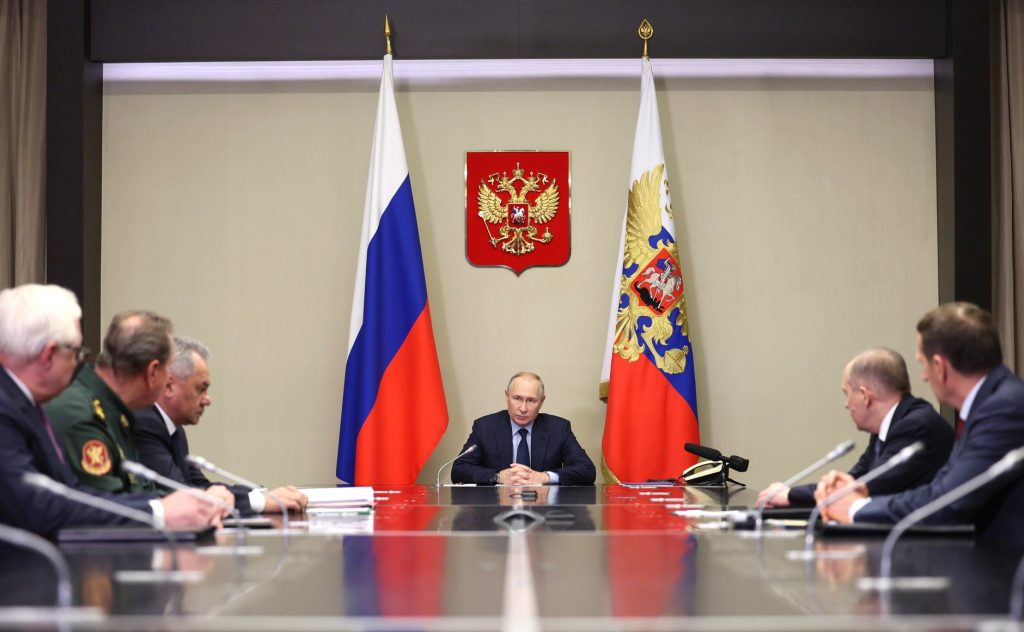
On Monday, October 16, Vladimir Putin held a meeting on operational issues, at which military operations in Ukraine and the situation in the Palestinian-Israeli conflict zone were discussed. The meeting was attended by Defense Minister Sergei Shoigu, Director of the Federal Security Service Alexander Bortnikov, Director of the Foreign Intelligence Service Sergei Naryshkin, Director of the Federal Service of National Guard Troops Viktor Zolotov, as well as Deputy Minister of Foreign Affairs Sergei Ryabkov.
Key theses:
- Shoigu: “The spring offensive campaign was completed, as the Ukrainian authorities planned, the summer one, now the autumn one – and in none of these campaigns did they achieve any success, any significant success.”
- Shoigu: “After the start of the summer campaign on June 4, the enemy suffered, if not significant, then large, serious losses in manpower and equipment – hundreds of tanks, more than a thousand, almost one and a half thousand armoured vehicles – and they continue to do so.”
- Ryabkov: “The situation in the conflict zone in the Middle East tends to worsen, in our assessment. The operations carried out by the Israeli army are indiscriminate. The threat of a ground operation and entry into Gaza remains.”
- Ryabkov: “Diplomatic activity is increasing along various lines. In principle, the threat of this conflict getting out of control is high. We will make every effort in cooperation with partners and like-minded political parties to stop the current situation and create conditions, including guaranteeing the departure of our citizens from the risk zone, from the threatened zone.”
Outcomes and outlook:
Putin shows that all operational and tactical issues are under his personal control. He seeks to show that the authorities in Russia are strong; they control the situation and make correct and timely decisions. Public coverage of such meetings aims to strengthen Putin’s image in the media space and show that he personally manages the processes and influences the situation in the country and the world.
The topics discussed at the meeting are also indicative. Like the United States or China, Russia is forced to respond to the situation in the Middle East since the further results of this escalation will have broad consequences for the whole world. In this context, it is essential to understand that the Palestinian-Israeli conflict is forcing all global parties to reconsider or change their positions, including in the Ukrainian direction. In this case, Russia is no exception. Of course, we are not talking about de-actualising the topic of Ukraine – the West is demonstrating that its support remains strong. However, the loss of information focused on the Ukrainian issue is already observed, which, most likely, Russia will actively take advantage of.
At the same time, Ascolta sources note that the meeting itself was not held at Putin’s residence in Novo-Ogarevo, as pointed out in the official report, but in Altai, where Putin went immediately after the CIS summit in Bishkek and stayed there until he visited Beijing. Sources do not say precisely what this conspiracy is connected with, but they say that at that time, the Russian president was neither in the capital nor nearby residences.
- Telephone conversations of Vladimir Putin with the leaders of some Middle Eastern states
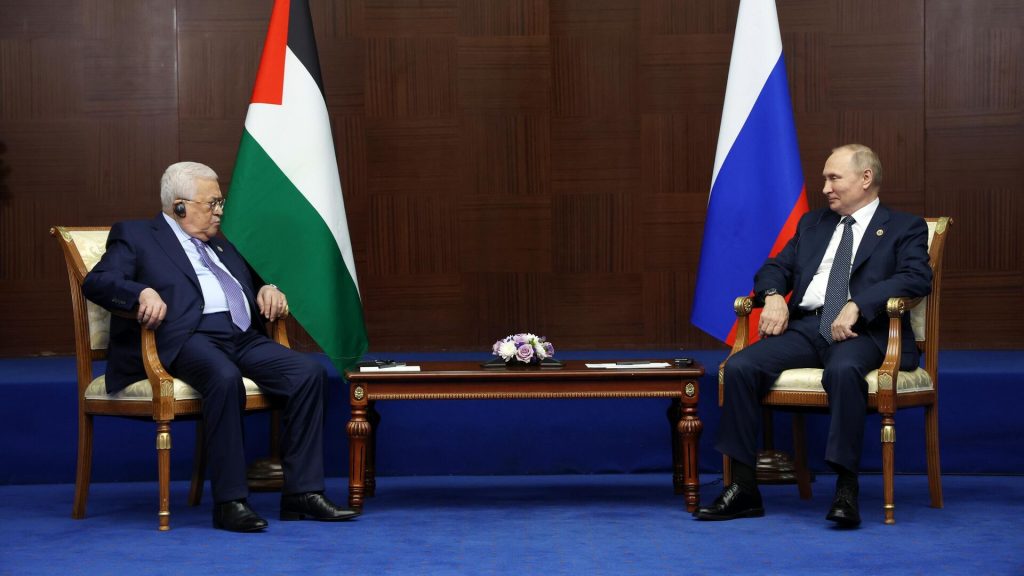
On Monday, October 16, Vladimir Putin held telephone conversations with the leaders of several Middle Eastern states. In particular, the Russian president spoke with Syrian President Bashar al-Assad, Iranian President Ebrahim Raisi, the leader of the partially recognised state of Palestine, Mahmoud Abbas, and Egyptian President Abdelfattah Sisi.
It is noted that the main topic of conversation was the escalation of the situation around the Palestinian-Israeli conflict, as well as the humanitarian situation in the Gaza Strip. According to the general position of the parties, expressed following telephone conversations, the main reason for the current escalation is the long-term stagnation in the Middle East settlement process. In this context, the Russian president announced the need to resume the political process to create the state of Palestine within the previously established borders. Putin’s interlocutors supported a similar opinion.
Outcomes and outlook:
Russia understands that despite the presence of interests in the region, it plays the role of a statistic in Middle Eastern affairs. Putin cannot influence the outcome of the Arab-Israeli confrontation. Moreover, having a limited presence in Syria and being a de facto ally of Iran, Russia cannot be considered an effective and impartial mediator in resolving the conflict between Israel and Hamas. Thus, Putin’s phone calls have dual purposes: a) informative (exchange of opinions and coordination of positions) and informational (demonstration in the media of the “influence” of the Russian president on issues on which his real influence is minimal.
As expected, Russia is completely consolidating its position on this issue with China, declaring the need for final recognition of Palestine as an independent state. However, such a position significantly affects relations with Israel, which is already becoming noticeable in the statements of individual Israeli politicians. In essence, Russia finds itself in a situation where any options for developing events will not be exclusively positive for it. However, a bet placed on Arab forces may be highly losing.
- Telephone conversation between Vladimir Putin and Israeli Prime Minister Benjamin Netanyahu
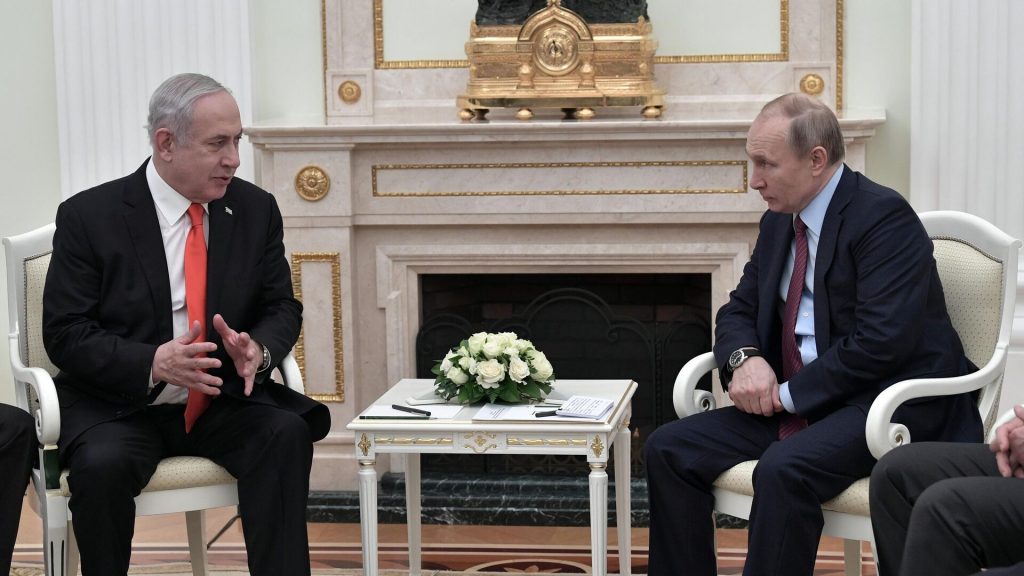
On Monday, October 16, after communicating with the leaders of several Middle Eastern states, Vladimir Putin had a telephone conversation with Israeli Prime Minister Benjamin Netanyahu. According to the parties’ statement, during the conversation, they discussed possibilities for an early cessation of hostilities and a transition to a peaceful resolution of the conflict. It is also noted that Putin once again voiced to Netanyahu the position of the leaders of several Arab countries and called for a solution to the Palestinian issue.
Outcomes and outlook:
Despite the close personal relationship between Putin and Netanyahu and the presence of a vast Russian and post-Soviet diaspora in Israel, Putin cannot boast of particular influence on resolving issues of the Middle East crisis. Netanyahu’s call could have several goals: firstly, since Russia is betting on developing priority relations with the Arab world, this is an attempt to act as a judge and lawyer, and secondly, it is an attempt to coordinate positions on the eve of Joe Biden’s visit to Israel.
There is no reason to expect concrete results or any strengthening of Russia’s position in the Middle East. Given the close partnership between Israel and the United States, Russia is forced to continue to implement the “Primakov Doctrine” and rely on the Arabs, and therefore act as a biased party.
It is possible that during the conversation, they also discussed unspoken “red lines” beyond which the parties will not go in this situation, which in the future will make it possible to maintain relations between the two states, regardless of the development of the situation.
- Vladimir Putin’s visit to China
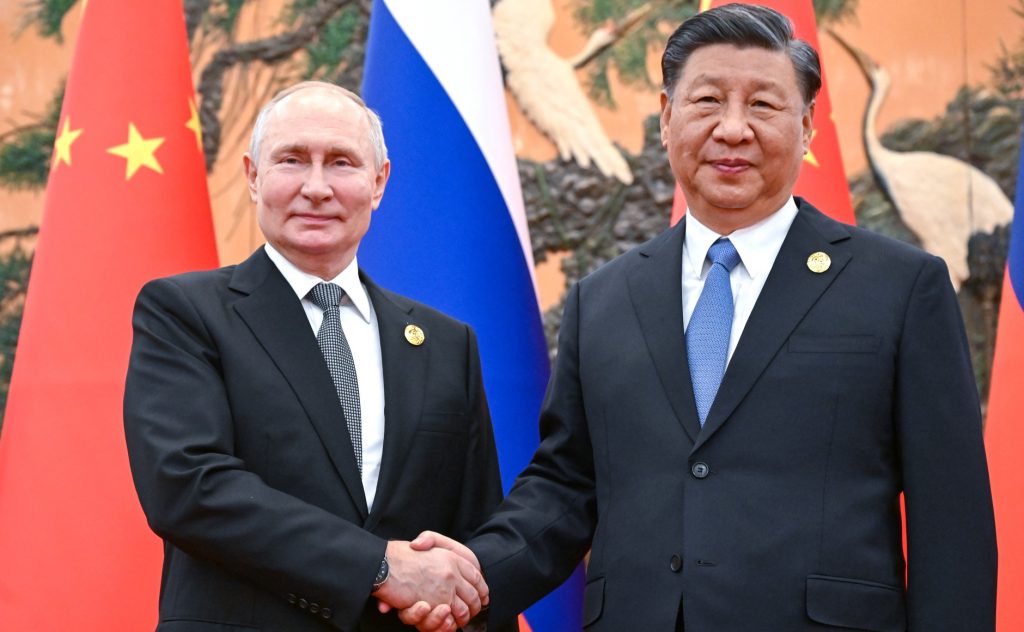
On Tuesday, October 17, Vladimir Putin’s two-day visit to China began. It became the Russian president’s first visit outside the post-Soviet space after the start of Russia’s full-scale aggression against Ukraine. The official purpose of the visit was Putin’s participation in the “One Belt, One Road” forum. Still, in addition to the event itself, Putin also held meetings with several leaders of Asian countries, spoke with the media, and took part in the final press conference.
Timeline:
- On October 17, Putin met with Vietnamese President Vo Van Thuong:
- Putin: “Unfortunately, we observed some trade and economic interaction decline last year. But this year, we see a certain upward adjustment; the growth amounted to more than six per cent in the first six months of this year.”
- Putin: “Humanitarian ties are also developing. In this regard, I would like to note a significant moment which symbolises our relations – the monument’s opening to Comrade Ho Chi Minh in St. Petersburg on June 30. This was timed to coincide with the 100th anniversary of his first visit to the Northern capital of Russia.”
- Vo Van Thuong: “Vietnam consistently attaches great importance to the comprehensive strategic partnership of our countries, as well as the proximity and close connection that has existed between our countries for many years.”
- Vo Van Thuong: “Vietnam considers Russia a top priority in its foreign policy. Therefore, we wish to develop relations with your country meaningfully and effectively. The Vietnamese people remember well the great kind assistance provided by the Soviet Union, Russia and the Russian people during the difficult years of the war and now, when we are developing our country.”
- Vo Van Thuong: “Secretary General Nguyen Phu Trong, I personally and other leaders of Vietnam are waiting for you on an official visit to Vietnam to discuss the main measures of cooperation between our countries.”
- Vo Van Thuong: “Now I’ll say a little about cooperation in the oil and gas field. Thank you for the fact that Russia helped Vietnam create this industry from the very beginning, and over the past time, we have also achieved good results.”
- Putin’s meeting with Prime Minister of Thailand Settha Thaweesin:
- Putin: “Thailand is Russia’s oldest partner in Southeast Asia. Last year marked the 125th anniversary of the establishment of diplomatic relations. Our relations have always been mutual respect, friendship and consideration of each other’s interests. Until now, relations between our countries are developing in many ways: in the humanitarian, economic and political spheres.”
- Putin: “What’s gratifying is that our relations in the humanitarian sphere do not stop. Today, 150 students from Thailand are studying in Russia. The flow of tourists is increasing; almost a million Russians visited Thailand in January–September this year. In 2024–2025, we expect cross-years of cultural exchanges and tourism between Russia and Thailand.”
- Thavisin: “Today we have little time, so I will say what is important. These are questions about agricultural products.”
- It is worth noting that in addition to the main delegates from the Russian side, the General Director of the Russian Direct Investment Fund, Kirill Dmitriev, was also present at this meeting, which may indicate plans to sign several investment projects.
- Putin’s meeting with President of Mongolia Ukhnagiin Khurelsukh:
- Putin: “The Soviet Union was the first country to recognise Mongolia, and next September, we celebrate the 85th anniversary of our common victory at Khalkhin Gol. Then over 10 thousand soldiers and commanders of the Red Army gave their lives defending Mongolia.”
- Putin: “Last year, we significantly increased trade turnover, about 40 per cent. This year, it has adjusted slightly. But we have something to discuss, and our intergovernmental commission should pay appropriate attention to this.”
- Putin: “We also have multifaceted projects, including jointly with the People’s Republic of China, I mean, for example, constructing a gas pipeline system through Mongolia to China. Everyone here agrees with this project; all parties want to participate, want to work; it’s a matter of implementation.”
- Khurelsukh: “As you have already noted, in 2019, we entered into a strategic partnership and comprehensive cooperation – this became the basis for further cooperation and friendship. Of course, a lot of time has passed since then. There were some difficulties in geopolitics and the economic state of the world order, but now, to our joy, the economic situation is improving.”
- Khurelsukh: “I am glad our cooperation and relations have intensified recently. The Speaker of the Parliament of the Russian Federation, Mr. Volodin, just recently visited Mongolia. The first meeting of the Cooperation Commission between the State Great Khural of Mongolia and the State Duma of the Russian Federation was held, and a working group was created. Our Mongolian side has always strived to cooperate with Russia in all areas of our active cooperation.”
- Khurelsukh: “We have a great interest in cooperation with Russia on all major projects that we plan to implement in the coming years: in the energy sector, railways, highways. Ulaanbaatar Railway is our joint venture, which is a symbol of our friendship. It now has a freight turnover of 30 [million] tons per year, and we have a great opportunity to increase freight traffic to 100 million tons per year.”
- Putin’s meeting with Laotian President Thongloun Sisoulith
- Putin: “In general, the political level is excellent; we need, of course, to fill it with economic content. Unfortunately, last year it [trade turnover] decreased further. But nevertheless, in my opinion, we have prospects and good prospects. We’ll talk about it now.”
- Sisulit: “Of course, we haven’t met for a very long time; the last time was maybe in 2017 in Singapore, very briefly. But time flies. The fact that you stood and talked [then] is prevalent in Laos. [People] said: what language did they speak? People in Laos are very touched that you conveyed to me then [words of] friendship and mutual understanding.”
- Putin’s meeting with acting Prime Minister of Pakistan Anwaar-ul-Haq Kakar:
- Putin: “As for the economy, Russia has traditionally been a supplier of food and grains. Trade turnover over the past year has grown, reaching generally acceptable values, and in the months of this year alone, in my opinion, a million tons of grain have already been supplied to your country. We are ready to fulfil our obligations, and I must note that there are all the grounds and prerequisites for this.”
- Putin: “But our capabilities in the trade and economic sphere are not limited to this; the potential is much more serious, larger, higher.”
- Kakar: “I am very glad to be here and meet with one of the most important actors in our region – Russia. We see Russia’s potential; we appreciate its contribution in the cultural sphere, the energy sector, the defence potential, and the potential for providing protection.”
- Kakar: “There are many areas in which the interests of Pakistan and Russia coincide. First of all, this is the fight against terrorism, a regional approach to Afghanistan primarily and other territories that are under the influence of the Russian Federation. All of this deserves a regional and collaborative approach.”
- Kakar: “We feel our unity, we feel the closeness of our positions. We are a country with great energy development prospects and a huge market.”
- At the end of the first day of his visit to Beijing, Vladimir Putin held an informal meeting with the presidents of Kazakhstan and Uzbekistan.
- On Wednesday, October 18, Vladimir Putin took part in the opening ceremony of the “One Belt – One Road” forum, where he made an official speech:
- “I agree with the Chairman of the People’s Republic of China that the Chinese idea of “One Belt, One Road” logically fits into multilateral efforts to strengthen creative and constructive interaction throughout the global community.”
- “The One Belt, One Road initiative, built on such basic principles, fits well with the integration processes developing in various regions. It is also consonant with Russian ideas to create an integration circuit where freedom of trade, investment, and labour would be fully ensured, and an interconnected infrastructure would be established.”
- “It is important that there is a specific agreement between Russia and China on the parallel and coordinated development of the Eurasian Economic Community and the One Belt, One Road program and that a non-preferential agreement on trade and economic cooperation between the Eurasian Economic Community member states and the People’s Republic of China is being implemented.”
- “I’ll just mention some of our long-term plans, which are already beginning to be implemented in practice and harmoniously complement other infrastructure projects in Eurasia, including those promoted within the framework of the One Belt, One Road initiative, and together make it possible to create a unified transport and logistics frame, diversify cargo flows through more efficient, reliable, safe deliveries.”
- “So, in the European part of Russia, we are forming an international North-South corridor,” the Chairman of the People’s Republic of China also mentioned this, “linking Russian ports in the Baltic and Arctic with ports on the coast of the Persian Gulf and Indian Ocean. As experts say, seamless railway communication will be ensured along the entire route – from our northern city of Murmansk to Iranian Bandar Abbas.”
- “Another transport meridian from North to South will pass through the Ural region of Russia and Siberia. Its key elements are the modernisation of the central section of the Trans-Siberian Railway, including the West Siberian Railway on the territory of our regions – Omsk region, Novosibirsk, Kemerovo, Tomsk regions, Altai Territory – these are all regions of Siberia of Russia. This is also the construction of the Northern Latitudinal Railway, as we call it – this is another railway line with access to the ports of the Arctic Ocean and the Yamal Peninsula in the north of the Russian Krasnoyarsk Territory – and the new North Siberian Railway from the Khanty-Mansiysk Autonomous Okrug of Russia to its connections with our largest railway network, with the Trans-Siberian Railway and the Baikal-Amur Mainline.”
- “At the same time, we are working with foreign partners to build railway routes from Central Siberia in a southern direction – towards China, Mongolia, and the ports of the Indian and Pacific Oceans.”
- “And finally, we are planning another corridor from the Arctic to the South in the Far East; its elements are also being formed. This is a railway line from the BAM to Yakutia, bridges across the Lena and Amur – these are huge Siberian rivers, the Pacific Railway, the modernisation of highways, the creation of deep-water terminals on the eastern section of the Northern Sea Route.”
- “Taking this into account, Russia, which next year will chair the enlarged BRICS, has taken the initiative to establish within the framework of this association a permanent commission on transport logistics, which – with the participation of BRICS members, partner countries of our association, and other interested states – could deal with the development of international transport corridors in their entire complex.”
- After the opening ceremony of the “One Belt, One Road” forum, Vladimir Putin held negotiations with the Chairman of the People’s Republic of China, Xi Jinping (the negotiations lasted more than three hours):
- Xi Jinping: “I note with satisfaction that the governments, ministries and departments, as well as regions of China and Russia, are working hard to implement the important agreements we have reached. Political mutual trust is steadily deepening. Close and effective strategic interaction is maintained. Bilateral trade turnover has reached historical records and is approaching our 200 billion US dollars target.”
- Xi Jinping: “For ten years – starting from 2013 – you and I, Mr. President, have held 42 meetings, established good business relations, and strong personal friendship. Next year marks the 75th anniversary of establishing diplomatic relations between China and Russia.”
- Xi Jinping: “The Chinese side is ready, together with Russia, sensitively understanding the trend of history and following the trend of world development, to invariably rely on the fundamental interests of the peoples of the two countries, to continuously enrich bilateral cooperation with the content necessary in the new era for the sake of the development and prosperity of the two countries; “Exercise a sense of responsibility as great powers, contribute to international justice and impartiality, and promote the common development of the whole world.”
- Putin: “You have just outlined a severe, large program for the further development of your idea of one path and one destiny, in fact, as you say about it, of all humanity. We sincerely wish you good luck in this noble endeavour.”
- Putin: “In the current difficult conditions, close foreign policy coordination is especially in demand, which is what we are doing, and today we will also discuss all this – everything, including our bilateral relations, above all this.”
- Putin: “Now, you just mentioned our plan, our task – to achieve 200 billion in trade turnover this year. If you look year by year – we analysed it last night – from today, a year ago, there are already 200 billion. And according to the calendar year, this bar will also be surpassed. So, we are moving very confidently bilaterally.”
- Following his visit to China, Vladimir Putin held a press conference, during which he answered questions from Russian journalists:
- “We discussed [with Xi Jinping] the situation in the Middle East in some detail. I informed the Chairman about the situation that is developing on the Ukrainian track, also in some detail. So, probably – we talked for three hours – to present everything in detail, it also takes three hours. We don’t have that kind of time, and we don’t need it. I have named the main topics and directions.”
- “We reached certain agreements in March; by the way, eight points were set out. Now, in Bishkek, the prime ministers will have to detail these points and sign a plan for our interaction until 2030. This is a perfect plan – it is concrete and significant.”
- “As for the attack [on the Gaza Strip], as you said, on the hospital, the tragedy that occurred there is a terrible event: hundreds killed, and hundreds wounded. This, of course, is a disaster in one place, especially in a place of a humanitarian nature. I really hope this will signal that this conflict needs to be ended as quickly as possible; in any case, the matter needs to be reduced to the possibility of starting some kind of contacts and negotiations.”
- “If they [the United States] did not supply weapons [to Ukraine], they could in the future say: “If we supplied everything we could, then the situation would change, but this would lead to unnecessary casualties. We are so good – we didn’t do it.” But they did it, and there will be no result. That’s why it’s a mistake.”
- “And finally, there is nothing good for Ukraine in this sense – it just prolongs the agony. They launched the long-awaited and long-awaited next counter-offensive, now in the Kherson direction – there is no result yet. There are losses – there is no result, just as in Zaporizhzhia and other directions. Therefore, from this point of view, this is also a mistake.”
- “And finally, a mistake of a larger scale, as yet invisible but still of great importance, is that the United States is becoming more and more personally drawn into this conflict. They are drawn in – this is an obvious thing. And let no one say that they have nothing to do with this. We believe that they have. Moreover, against the backdrop of the Middle East conflict, all this is happening and heating up the atmosphere.”
- “They [the United States] took and dragged two aviation groups into the Mediterranean Sea. I want to say that this is not a threat – what I will say now and what I will inform you about, but on my instructions, the Russian Aerospace Forces are beginning to patrol permanently in the neutral zone of airspace over the Black Sea. Our MiG-31 aircraft are armed with Kinzhal systems. They are known to have a range of over a thousand kilometres at a speed of Mach nine.”
- “As for the creation of a Palestinian state, in our opinion – we have a principled position; it is not related to today’s crisis at all, although, of course, it brings this problem to the surface – nevertheless, we have always advocated the creation of a Palestinian state, independent, sovereign, with its capital in East Jerusalem.”
- “Yes, Vucic and I talked on our feet. He is also concerned about the situation that is developing in his region, around Serbia. We share these concerns. Regarding the meeting with Prime Minister Orban, you said his optimism is exhausted. I don’t know; it seems Mr. Orban is a pragmatic and optimistic person in principle. I don’t think it’s true that his last bit of optimism has been exhausted.”
- “When asked whether the prospect of some kind of peaceful settlement is possible, I said what I have said many times: if the Ukrainian side wants a real negotiation process, then it needs to be done not with some theatrical gestures but the first thing that needs to be done is – cancel the decree of the President of Ukraine prohibiting negotiations.”
- “We hear now that they seem to be ready for some kind of negotiations. The responsible persons overseeing foreign policy direction and who recently spoke about the need to inflict a strategic defeat on Russia on the battlefield have already spoken in a different voice and are discussing the need to solve these problems through peaceful negotiations. This is the right transformation, a transformation in the right direction. Mr. Borrell has already spoken about this, and I will praise you for this. But this is not enough. We need to take concrete steps if we want to reach an agreement.”
Outcomes and outlook:
Putin’s visit to China was perhaps the most anticipated (from Russia’s point of view) international event of the end of 2023. This visit attracted special public attention in Russia for several months; additional international consultations, discussions, etc., were held. However, the visible part of the visit brought relatively modest results. Putin has demonstrated that he views China as a senior partner, not an equal. The stated level of $200 billion in trade turnover is an impressive figure if you do not consider the fact that trade turnover between China and the United States is $760 billion, with the EU – 530 billion and Taiwan – 300 billion. China continues to be inclined to use Russia as a raw material source base and as a trigger in foreign policy issues, denying the status of an equal partner.
What’s left behind the scenes? First: the issue of Ukraine (given the upcoming meeting between Xi Jinping and Biden in early November, Putin could not help but touch upon the Ukrainian issue, especially since it was raised during the press conference – Putin hopes that Xi, in a conversation with Biden, will push the “Ukrainian crisis” to a resolution at the negotiating table – that’s why Putin emphasised positive signals from Ukraine regarding the negotiations).
Second: the question of Putin’s subsequent tenure. In Russia, many experts agree that Xi Jinping also agreed upon a similar issue (Putin’s nomination for a new term or not). Third: integration processes in the post-Soviet space (spheres of influence of Russia and China in Central Asia, the issue of integration of Belarus, etc.). It is quite possible that issues of China’s assistance in overcoming Western sanctions were also discussed. But the fact that Putin was placed on Xi’s right hand in the final photograph shows that Russia remains, although a junior partner, China’s “favourite junior partner.”
- Meeting of Vladimir Putin with Prime Minister of Hungary Viktor Orban
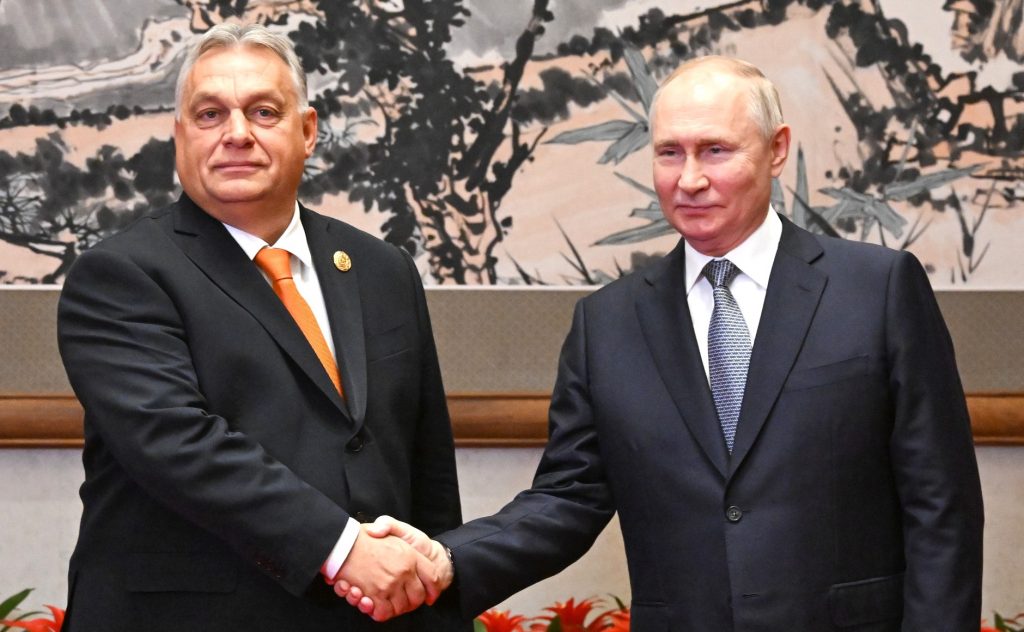
On Tuesday, October 17, on the sidelines of the One Belt, One Road forum, which took place in Beijing, Vladimir Putin met with Hungarian Prime Minister Viktor Orban. The parties discussed bilateral cooperation in the context of sanctions and the geopolitical situation and exchanged views on several foreign policy issues. Also, from the Russian side, the meeting was attended by Foreign Minister Sergei Lavrov, Deputy Prime Minister Alexander Novak, Presidential Aide Yuri Ushakov, Minister of Economic Development Maxim Reshetnikov, General Director of the state nuclear energy corporation Rosatom Alexey Likhachev and Chairman of the Board of PJSC Gazprom” Alexey Miller.
Key theses:
- Putin: “Even though in today’s geopolitical conditions, the opportunities for maintaining contacts and developing relations are very limited, nevertheless, it cannot but cause satisfaction that our relations with many European countries are maintained and developing. One of these countries is Hungary.”
- Putin: “Last year, there was a significant increase in trade and economic interaction – over 80 per cent. Unfortunately, in the first seven months, we have seen a decline of minus 35 per cent this year. This does not make up more than 80 [per cent] of last year, thank God, but there are still reasons to think about what needs to be done to influence this process positively. This is the first.”
- Putin: “Of course, it is very important to have the opportunity with one of the EU countries, with Hungary in this case, to exchange views not only on bilateral relations but also on the situation in the world, in Europe. We know that our positions do not always coincide, but to have the opportunity to exchange opinions, in my opinion, is always extremely important.”
- Orban: “I counted: since 2009, we are meeting for the 13th time. There have been difficult meetings, but never as difficult as this one – we have never been in such a difficult situation before.”
- Orbán: “Hungary never wanted to confront Russia; on the contrary, Hungary’s goal has always been to establish and mutually expand the best contacts. And we succeeded. However, due to the [so-called] military operation and sanctions, our relations, unfortunately, suffered a lot, and this deeply affected the “fabric” of what you and I built together.”
- Orban: “I want to thank you for the fact that Rosatom continues to be our excellent partner. I would like to thank Gazprom for fulfilling its obligations under the agreement. Therefore, we could save much of what we had previously achieved.”
Outcomes and outlook:
Viktor Orban not only remains Russia’s ally in the European Union and NATO. He needs to act as a possible mediator between Putin and some EU states and also, possibly, as one of the instruments for resolving the situation around the war with Ukraine. Orban is the only EU leader who agrees to meetings with Putin (recently, Finnish President Sauli Niinistö applied to meet with Putin). Hungary has many issues that force it to be in the orbit of Russia’s influence: this includes the country’s dependence on Russian energy resources, the construction of a nuclear power plant, and special claims from Brussels. Putin sees that with the help of Orban, he can build his own game in Eastern Europe (which has already resulted in the victory of Robert Fico and his party in the elections in Slovakia). Thus, we can predict that we can hardly expect changes in relations between Russia and Hungary shortly.
At the same time, it is important to note that in addition to Orban, Putin also talked with other representatives of Western politics. In particular, Serbian President Aleksandar Vucic attended the “One Belt, One Road” forum (Putin announced an informal meeting with Vucic during the final press conference), as well as the High Representative of the European Union for Foreign Affairs and Security Policy, Josep Borrell. Ascolta’s sources confirm that Putin also had a very productive conversation with him.
In this context, it can be assumed that shortly, Moscow will conduct an information campaign to demonstrate the absence of isolation of Russia and Putin personally by European politicians.
Moreover, the publication of an excerpt from Putin’s interview, where he addresses German citizens in German and once again voices compliments to Germany, indicates an attempt to create an image of friendliness. It is important to note that this is happening against the backdrop of an intensifying internal political crisis in Germany and, apparently, has the goal of flirting with the local opposition and that part of the population that has a more positive attitude towards Russia.
- Vladimir Putin’s trip to the headquarters of the Southern Military District
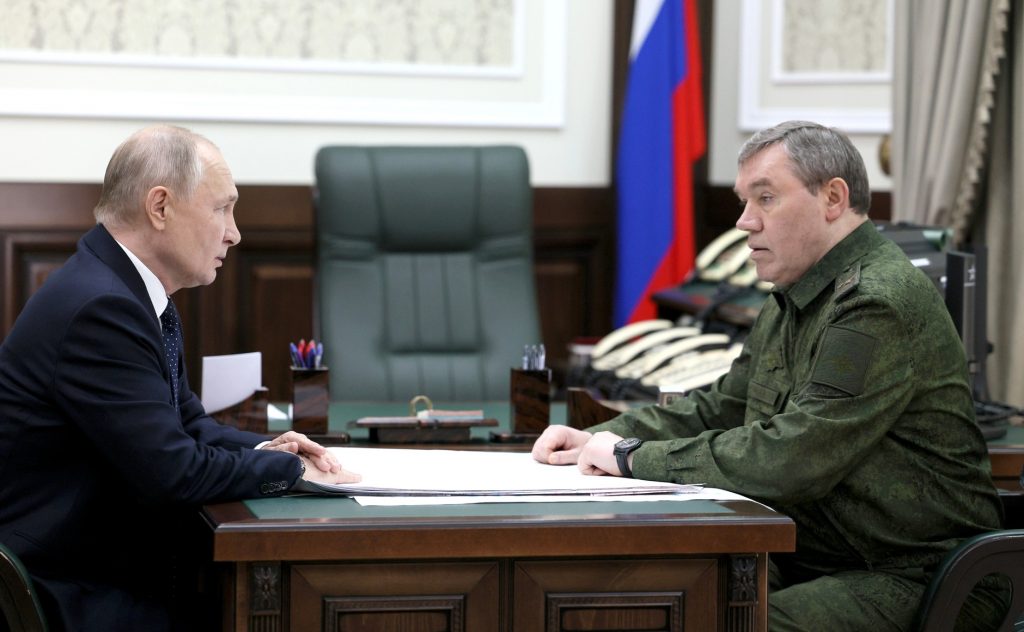
On Friday, October 19, Vladimir Putin arrived in Rostov-on-Don, where he visited the headquarters of the Southern Military District. It is reported that during his visit to the headquarters, the Russian president heard a report from the Chief of the General Staff of the Russian Armed Forces, Valery Gerasimov, on the progress of military operations on the territory of Ukraine and also held conversations with other representatives of the top leadership of the Ministry of Defense.
Outcomes and outlook:
Putin’s trip to Rostov-on-Don is demonstrative: firstly, to show the public that the issue of the so-called “SMO” is under the president’s control. Secondly, act as a “father to the soldiers” and directly take an interest in what is happening at the front. In this regard, Putin tries on the image of Nicholas II, who constantly inspected headquarters during the First World War and came directly to combat positions.
It was also in Rostov that Putin announced several personnel appointments, which, although expected, were formalised only during a visit to the headquarters of the Southern Military District. In particular, on October 20, General Afzalov officially became the commander of the Aerospace Forces, thereby taking the position of General Surovikin.
It can be assumed that another purpose of Putin’s visit to Rostov-on-Don was to personally adjust the military operations in Ukraine following a discussion of this issue with Xi Jinping. This version requires additional confirmation. However, if this is the case, the results will become noticeable soon. Moreover, we can talk about both de-escalation and escalation of the situation.
- Lavrov’s visit to the DPRK.
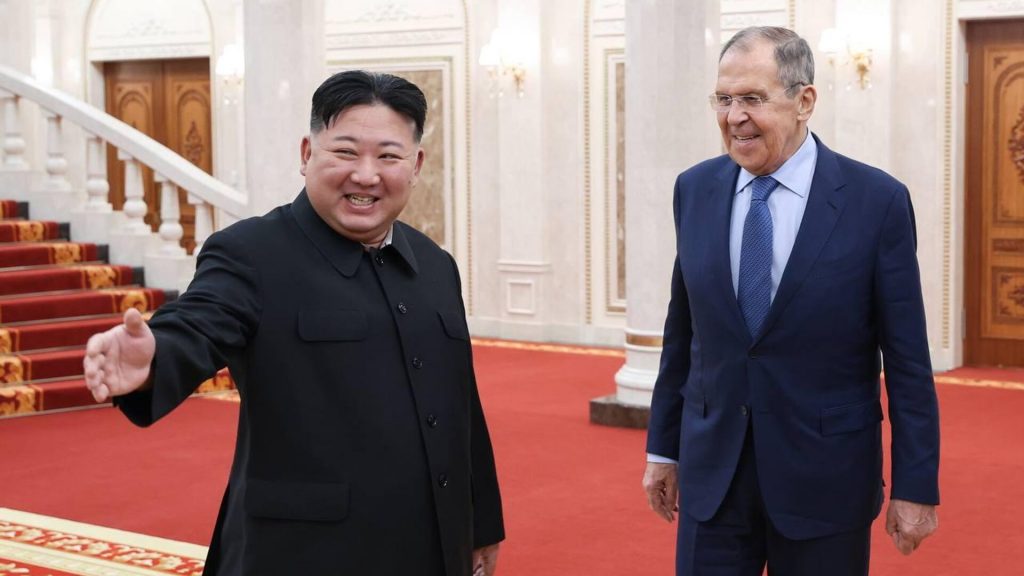
On Wednesday, October 18, Russian Foreign Minister Sergei Lavrov arrived on an official visit to Pyongyang, where he met with North Korean Foreign Minister Cho Son Hui and North Korean leader Kim Jong-un.
During a meeting with Cho Song Hui, Lavrov noted that relations between Russia and the DPRK had reached a qualitatively new strategic level. He also said that countries seek constructive alternatives to escalating regional tensions. In particular, he accused the United States of moving strategic infrastructure to the region, including nuclear elements. He called the military policy of the United States and its Japanese and South Korean allies towards North Korea dangerous. In turn, the Minister of Foreign Affairs of the DPRK noted that negotiations with Lavrov will be essential to implement the agreements reached at the September summit of Vladimir Putin and Kim Jong-un.
After returning from Pyongyang, Lavrov commented on Washington’s statements that the DPRK could supply weapons to Russia: “You know, I don’t comment on rumours. The fact that Americans constantly blame everyone for everything is not news. Everyone knows this well.”
Outcomes and outlook:
Lavrov’s visit to Pyongyang logically continued the meeting between Putin and Kim Jong-un in the Far East. The trip of the leader of Russian diplomacy to North Korea is the practical side of the political agreement between the two countries’ leaders. There are no sensations or “double bottoms” in this visit – it simply indicates that the loud words and statements made by Putin and Kim have begun to come true – Lavrov simply came to approve the “road map” and a set of actions that will translate previous agreements into practice.
Apparently, shortly, we will witness the formation of a new alliance (most likely unofficial) or a conditional axis with the participation of Minsk, Moscow and Pyongyang, which could severely impact the Asia-Pacific region. In essence, we are talking about a unique response to strengthening the Western military presence in this region (within the framework of AUCUS and individual agreements with some countries). The exchange of resources (including military) or technologies can occur in the same format.
Even though this option for developing relations along a new axis primarily benefits China, this factor will also impact Europe and NATO since we are discussing creating an alliance of nuclear states hostile to the Western blocs.
- Adoption of the Law on the cancellation of ratification of the Comprehensive Nuclear Test Ban Treaty by the State Duma
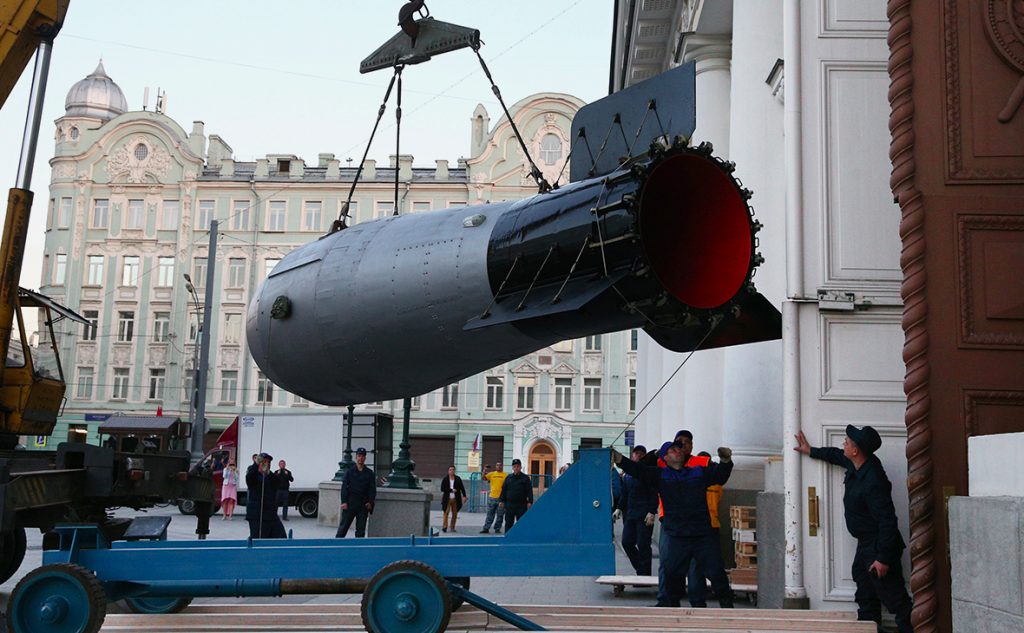
On Wednesday, October 18, the State Duma of the Russian Federation, in the second and third readings, adopted a law cancelling the ratification of the Comprehensive Nuclear Test Ban Treaty. It is expected that on October 25, at the scheduled plenary meeting, the Federation Council will approve the law, after which it will be sent to the president for signature. It is important to note that it was Vladimir Putin who voiced such an initiative during a recent speech at the Valdai Forum, which indicates that Putin will not hesitate to sign this law.
Outcomes and outlook:
In fact, we can talk about a new increase in the stakes in the big nuclear game. Over the past five years, the United States and Russia have taken many steps to deepen nuclear escalation. In this case, Russia makes it clear that its previous statements about a possible withdrawal from the Nuclear Test Ban Treaty are not just words. And most likely, new nuclear tests will be demonstrated to the world – and “in their glory,” with video recordings of the latest nuclear developments and their demonstration in the media. Nuclear blackmail has returned to the practice of world politics.
It is noteworthy that on the day of the vote on this law, the press service of the US Department of Energy announced that it had successfully conducted a test at a test site in Nevada, where an underground chemical explosion was carried out to improve its ability to “detect low-yield nuclear explosions around the world.” Also, many media outlets previously reported that Russia, the United States and China are updating the infrastructure at their nuclear test sites, which indicates preparation for new tests.
In fact, it can be said that the process of a new nuclear race has long been launched worldwide, news about which is only beginning to appear in public gradually.

